[ FULL TEXT ] Judge Grants Restraining Order Against Vax Mandate for Chicago Police and other Unions
In a six-page order filed Monday, November 1, 2021 at 10:00 a.m., Judge Raymond Mitchell granted part of a temporary restraining order sought by the Fraternal Order of Police Lodge 7 and other unions, meaning the city cannot terminate employees who fail to meet the end-of-year vaccination deadline, at least until the unions’ grievances can go through an arbitration process with the city.
Text of the Restraining Order
----------------------
IN THE CIRCUIT COURT OF COOK COUNTY, ILLINOIS COUNTY DEPARTMENT, CHANCERY DIVISION
Fraternal Order of Police Chicago Lodge No. 7, et al.,
Plaintiffs,
V.
City of Chicago, et al.,
Defendants.
Case No. 2021 CH 5276
Calendar 2
ORDER
RAYMOND W. MITCHELL, Circuit Judge.
Plaintiffs Fraternal Order of Police Chicago Lodge No. 7, John Catanzara, Jr., and Policemen's Benevolent and Protective Association of Illinois, Units 156A, 156B, and 156C, Sergeants, Lieutenants, and Captains, James Calvino, Michael Stiscak, and Kevin Chambers, move for a temporary restraining order. These police unions seek to enjoin the implementation of Defendant City of Chicago's COVID-19 vaccination policy until such time as the unions' grievances can be arbitrated pursuant to their collective bargaining agreements.
I.
By way of background, the City announced its COVID-19 vaccination policy applicable to all city employees on August 25, 2021. Compl. & Ans. ¶ ¶ 26, 44. [1] Subsequently, representatives from the police unions and the City met several times and traded proposals over policies to protect the health of police officers and the public. Compl. & Ans. ¶ ¶ 27·29, 45-47. Setting aside the parties' recriminations as to "why" and "how," the talks stalled. Compl. ¶ ¶ 30, 34; City Compl. ¶ ¶ 3, 4.
[1] The core facts are undisputed and are taken from the allegations of the police unions' verified complaint (''Compl."), the City's answer ("Ans.") and the City's verified complaint in a related case (21 CH 5275) ("City Compl.") as well as all their accompanying exhibits.
The City announced its finalized vaccination policy on October 8. Compl. & Ans. ¶ ¶ 30, 48. That policy requires, among other things, that City employees report their COVID-19 vaccination status by October 15, 2021 and that unvaccinated employees commence twice weekly testing. Compl. ¶ 31. Further, the policy requires all employees to be vaccinated by December 31, 2021 unless exempted for religious or medical reasons. Id. Finally, the policy provides that employees who fail to comply with these requirements shall be placed on "no pay" status until they comply. Id. Since October 15, the City has stripped 27 police officers and placed them on "non-disciplinary, no pay" status for failing to report their vaccination status. R. to Pls.' Mot. for T.R.O. at 7. In short, those police officers are not allowed to work.
The police unions and the City are parties to collective bargaining agreements that control the rights and responsibilities of these parties. Compl. ¶ ¶ 6, 9. These agreements provide that disputes arising under the agreements shall be resolved by arbitration. Compl. Ex. A, art. 9.2. This is the dispute resolution mechanism required by the Illinois Public Labor Relations Act. 5 ILCS 315/5. The police unions filed unfair labor practice charges with the Board, and subsequently on October 14, 2021 sought to arbitrate grievances related to the City's vaccination policy. The police unions then filed this action seeking to enjoin the City's implementation of its vaccination policy until such time as the parties can arbitrate.
II.
Under both federal and state law, injunctions in peaceful labor disputes are typically prohibited. 29 U.S.C. §§ 101-115; 820 ILCS 5/1 et seq. This reflects a legislative policy choice in favor of resolving such labor disputes before specialized administrative boards expert in labor law and interpreting collective bargaining agreements. In 1970, however, the United States Supreme Court created a narrow exception to the prohibition on injunctions in the labor context. Boys Markets, Inc. v. Retail Clerks Union, Local 770, 398 U.S. 235 (1970). In that case, the Court recognized that the absence of the availability of injunctive relief in arbitration could undermine the very legislative policy that mandates arbitrating labor disputes. Id. at 249. Thus, the Court affirmed the grant of an injunction in aid of arbitration where without such an order, the ultimate arbitration proceeding would be rendered meaningless. Id. at 253·54.
Consistent with federal law, the Illinois Appellate Court has recognized the same narrow exception when an injunction is "necessary to maintain the status quo in order to protect the integrity of the arbitral process." American Fed'n of State, Cnty & Mun. Employees, Council 31 v. Schwartz, 343 Ill. App. 3d 553, 561 (5th Dist. 2003). Such extraordinary relief is only appropriate upon a showing that the underlying dispute is one that the parties are contractually bound to arbitrate and that injunctive relief is warranted under "ordinary principles of equity" - a continuing violation, a likelihood of success on the merits, irreparable harm, and a balancing of the equities. Id.
Arbitrability. There is no serious dispute as to the arbitrability of the police unions' grievances. They squarely present disputes as to the interpretation and application of the collective bargaining agreements, and under those agreements, if such disputes cannot be resolved between the parties, they shall be arbitrated.
Compl. Ex. A, art. 9.2. Similarly, as to the continuing nature of these supposed breaches or the clear right to relief, there is no dispute.
Irreparable Injury. The City contends that the police unions cannot demonstrate the irreparable injury necessary to justify an injunction in favor of arbitration. The City has not refused to participate in arbitration, and it asserts that the remedies available in an arbitration award are sufficient to vindicate the unions should they prevail. "Obey now, grieve later"- a maxim in labor law - reflects the reality that in most cases, the arbitrator's power to make an award in favo1· of the aggrieved party is more than adequate to protect that party's rights. With regard to the police unions' complaints about the reporting and testing requirements in the City's vaccination policy, these are matters that can be remedied in arbitration should that prove necessary. The reporting obligation itself is a minimal intrusion particularly considering that police officers are already obligated to provide medical information to their employer. Should the reporting obligation prove to be a violation of the collective bargaining agreements, the arbitrator can order the information purged. And as to the twice weekly testing requirement, the unions have no objection.
But what of the December 31, 2021 vaccination requirement? "Obey now, grieve later" is not possible. If every union member complied and was vaccinated by December 31 (or otherwise exempt), they would have no grievance to pursue and there would be no remedy an arbitrator could award. An award of back pay or reinstatement cannot undo a vaccine. Nothing can. If that aspect of the City's policy was found to violate the collective bargaining agreements, the arbitral process could not restore the parties to their original positions. An award in favor of the police unions would be an "empty victory." Schwartz, 343 Ill. App. 3d at 561. "Obey now, grieve later" would be transformed into "obey now and forever" - without a meaningful opportunity to arbitrate. That constitutes irreparable injury.
This absence of meaningful arbitration is not just an injury to members, it is also an injury to the union itself. It undermines the unions' collective bargaining power and risks diminishing the union in the eyes of its members. Cf Duffy Tool & Stamping, L.L.C v. NLRB, 233 F.3d 995, 998 (7th Cir. 2000) (Posner, J.). The policy underpinning labor law is the promotion of labor peace by encouraging negotiation and bargaining and providing a meaningful forum to resolve disputes.
Likelihood of Success. In the context of an injunction in aid of arbitration, a plaintiff "need only establish that the position he will espouse in arbitration is sufficiently sound to prevent the arbitration from being a futile endeavor."
Schwartz, 343 Ill. App. 3d at 564. The police unions advance three basic grievances: (1) the City's unilateral imposition of the policy violates the impasse resolution procedure set out in the collective bargaining agreements; (2) the removal of non compliant officers prevents them from performing their duties as peace officers, in violation of the collective bargaining agreements and state law; and (3) the decision to strip non-compliant officers and place them on no-pay status constitutes a form of unauthorized discipline in violation of the collective bargaining agreements.
The City argues that its vaccination policy is a valid exercise of its management rights. The Illinois Public Labor Relations Act provides that "[e]mployers shall not be required to bargain over matters of inherent managerial power," 5 ILCS 315/4, and the collective bargaining agreements squarely place "standards of services" within management rights, Compl. Ex. A, art. 4. The Illinois Supreme Court has articulated a three-part test for determining when a matter is subject to mandatory collective bargaining. Central City Educ. Assn, IEA/1lEA v. Illinois Educ. Labor Relations Bd., 149 Ill. 2d 496, 523 (1992). But despite the City's argument that it will win on the merits on this point, all parties agree that this is most certainly not something that I should decide. That determination belongs to the experts at the Labor Board, particularly the third step in the analysis that requires a careful balancing of the competing interests of labor and management.
So, the police unions have made the requisite showing: they have colorable grievances rooted in the collective bargaining agreements.
Balance of Equities. In deciding whether to grant injunctive relief, courts of equity weigh a variety of factors including the public interest and hardships to the parties. ll1akindu v. Illinois High Sch. Assn, 2015 IL App (2d) 141201, ¶ 47. Both sides, the City and the police unions, make compelling arguments rooted in public policies that favor their respective positions. The City reminds us that the COVID pandemic has presented the worst public health crisis in over a century with a staggering loss of life and untold human suffering. But out of that crisis has come a remarkable scientific achievement: lifesaving vaccines that are both safe and effective. The City's vaccination policy represents a legitimate (indeed laudable) effort to protect the health of its employees as well as the public at large. All true.
The police unions argue that their right to engage in collective bargaining and pursue grievances in arbitration is deeply rooted in the public policy of the state of Illinois. The Illinois Public Labor Relations Act enacted expressly provides as much:
It is the purpose of this Act to prescribe the legitimate rights of both public employees and public employers, to protect the public health and safety of the citizens of Illinois, and to provide peaceful and orderly procedures for protection of the rights of all.
5 ILCS 315/2. Indeed, in approving the Senate bill that would become the Public Labor Relations Act, Governor James R. Thompson declared collective bargaining a "fundamental right." Journal of the Senate, 83rd Gen. Assembly, Reg. Sess., at 6462 (amendatory veto message) (Oct. 5, 1983). The Illinois Appellate Court has further recognized police officers and other public safety employees are prohibited from striking in exchange for the promise of an effective mechanism for resolving labor disputes. See, e.g., Village of North Riverside v. Illinois Labor Relations Ed., 2017 IL App (1st) 162251, ¶ 23; Board of Educ. v. Peoria Fed'n of Support Staff, 2012 IL App (4th) 110875, ¶ 16. Also, all true.
This case then presents two competing public interests, but one interest need not be scuttled in favor of another. The City's public health objective and the police union's desire to pursue their grievances are not wholly irreconcilable. I do not credit any suggestion that the City's vaccination policy is anything other than an effort to safeguard the health of its employees. Likewise, I do not accept that the police unions' grievances and alternate proposals are anything other than an effort to protect their members. Indeed, the labor movement has a proud history of advocating for measures to protect the health and safety of workers. It is worth remembering that in the darkest days of the pandemic and the months that followed, when I worked remotely in the safety of my home, the men and women of the Chicago Police Department showed up to work. It should be no surprise then as the City tells us that COVID was the leading cause of death among police in the United States in 2020 and 2021. R. to Pls.' Mot. for T.R.O. at 3; City Compl. ¶ 1. In light of that terrible sacrifice, the police unions' request just to have their grievances heard seems a pretty modest ask.
In terms of balancing harms, the City expresses a concern over any delay in fully implementing its policy. But the vaccination policy as it stands today requires unvaccinated police officers to submit to testing twice weekly. Presumably the City mandated this interim measure because it offers some protection to officers and the public. Further, as the City's own evidence illustrates, the principal risk to those who are unvaccinated is to themselves and to others who choose to be unvaccinated.
Arwady Aff. ¶ 10.
Narrowly Tailored Remedy. In weighing the traditional equitable factors and balancing the equities, I am persuaded that the police unions have demonstrated a need for temporary injunctive relief as to the December 31, 2021 vaccination requirement. Mindful that judicial intervention in labor disputes is disfavored, my intention is to enter the narrowest possible order to preserve the unions' right to a meaningful arbitration. The balance of the City's vaccination policy remains fully in effect, including the reporting and testing obligations.
A lesser remedy would be to order the parties to arbitrate the unions' grievances on an expedited basis, i.e., before December 31. The appellate court has done just that on at least one occasion. See FOP Chi. Lodge No. 7 v. City of Chicago, 2020 IL App (1st) 200066-U, ¶ 32. The City, however, tells me that I cannot lawfully order expedited arbitration since, under the collective bargaining agreements, such a proceeding must be mutually agreed. The City's counsel suggested at oral argument that it might be possible to arbitrate the grievances before December 31, 2021, but that is a matter for the parties to resolve among themselves. So, the only remedy left to protect the unions' right to meaningful arbitration is to stay compliance with the December 31 vaccination requirement until such time as the arbitration is complete. The effect of this Order is to send these parties back to the bargaining table and to promote labor peace by allowing them to pursue the remedies provided for in the Illinois Public Labor Relations Act. The City has it within its own power to avoid any burden, harm, or inconvenience occasioned by this Order simply by pursuing an accelerated arbitration.
III.
Therefore, it is hereby ORDERED:
(1) Plaintiffs' motion for temporary restraining order in aid of arbitration is GRANTED in part:
As to any of the bargaining unit members represented by Plaintiffs, their compliance with the December 31, 2021 vaccination requirement is STAYED until such time as their grievances can be arbitrated.
In all other respects, the City's vaccination policy remains in effect, and all other relief sought by Plaintiffs is denied.
(2) The matter is continued to November 10, 2021 at 1:00 p.m. for status.
Dated: November 1, 2021 at 10:00 a.m.
ENTERED,
Raymond W. Mitchell, Judge No. 1992
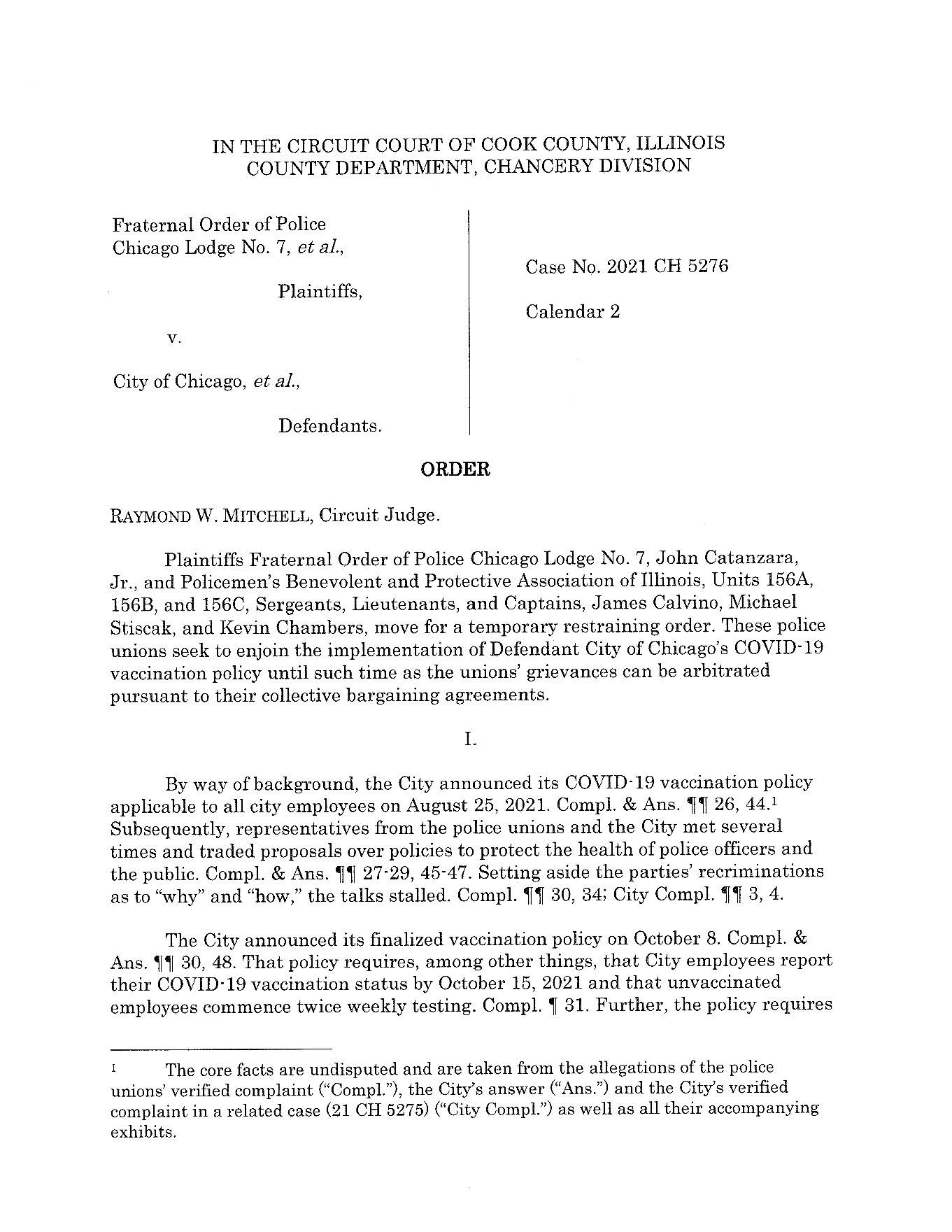
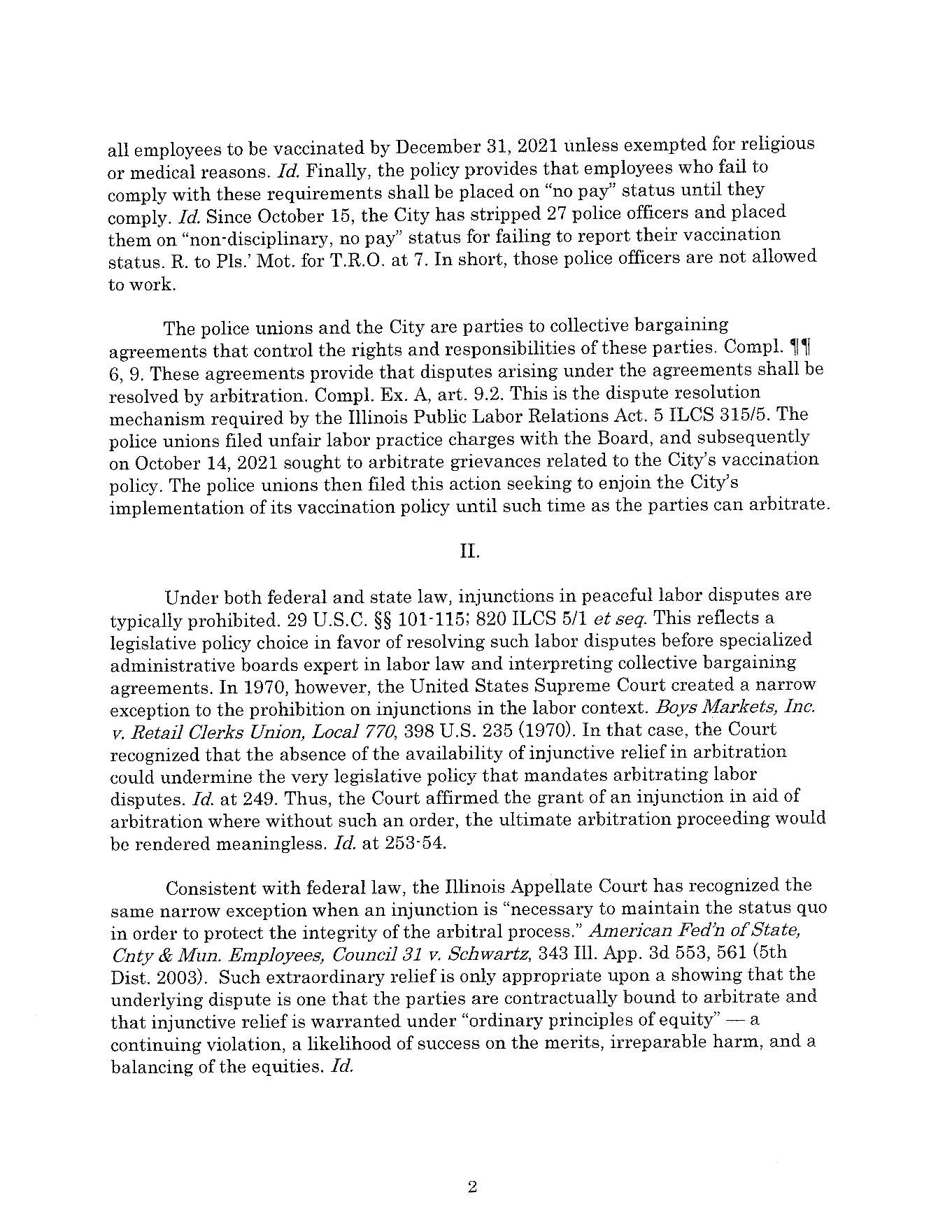
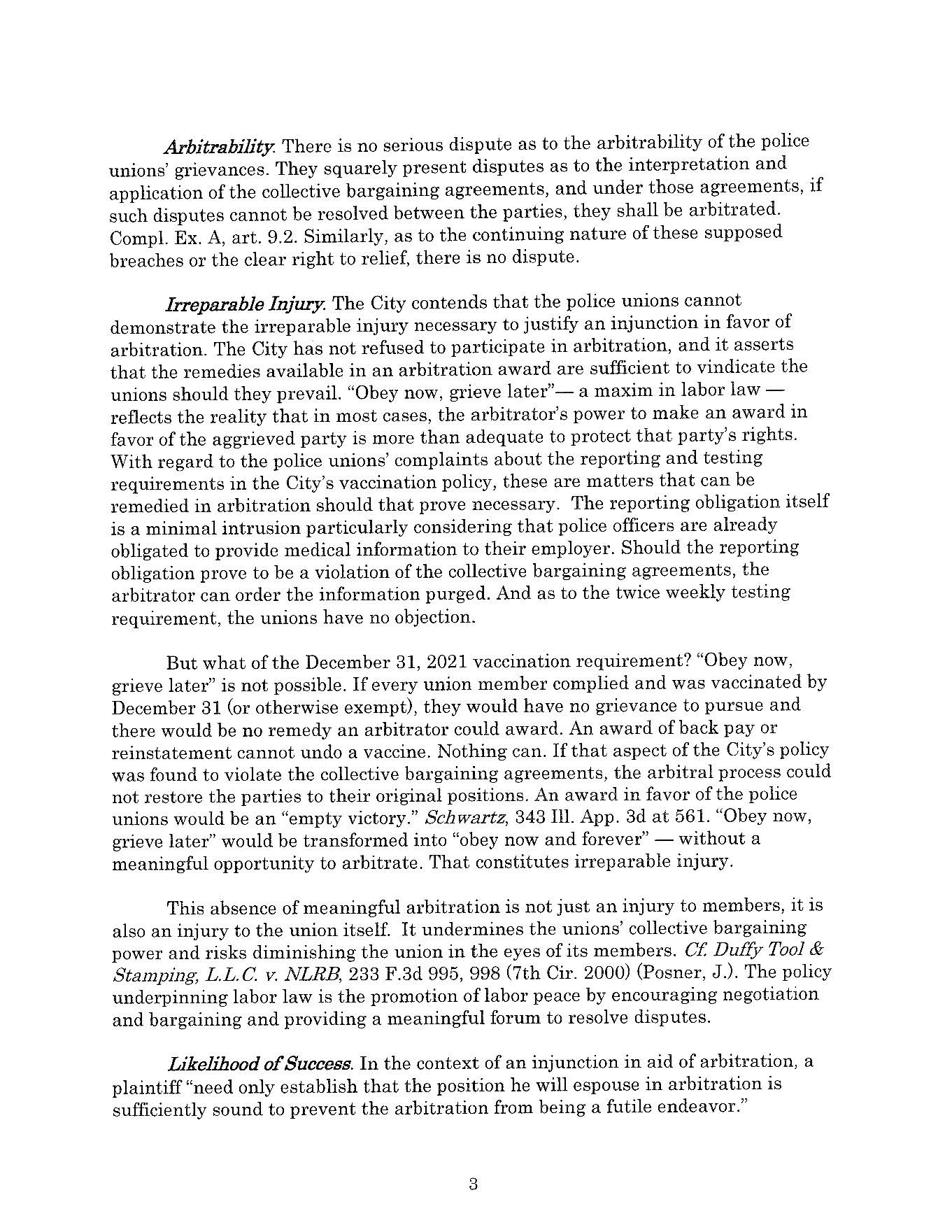
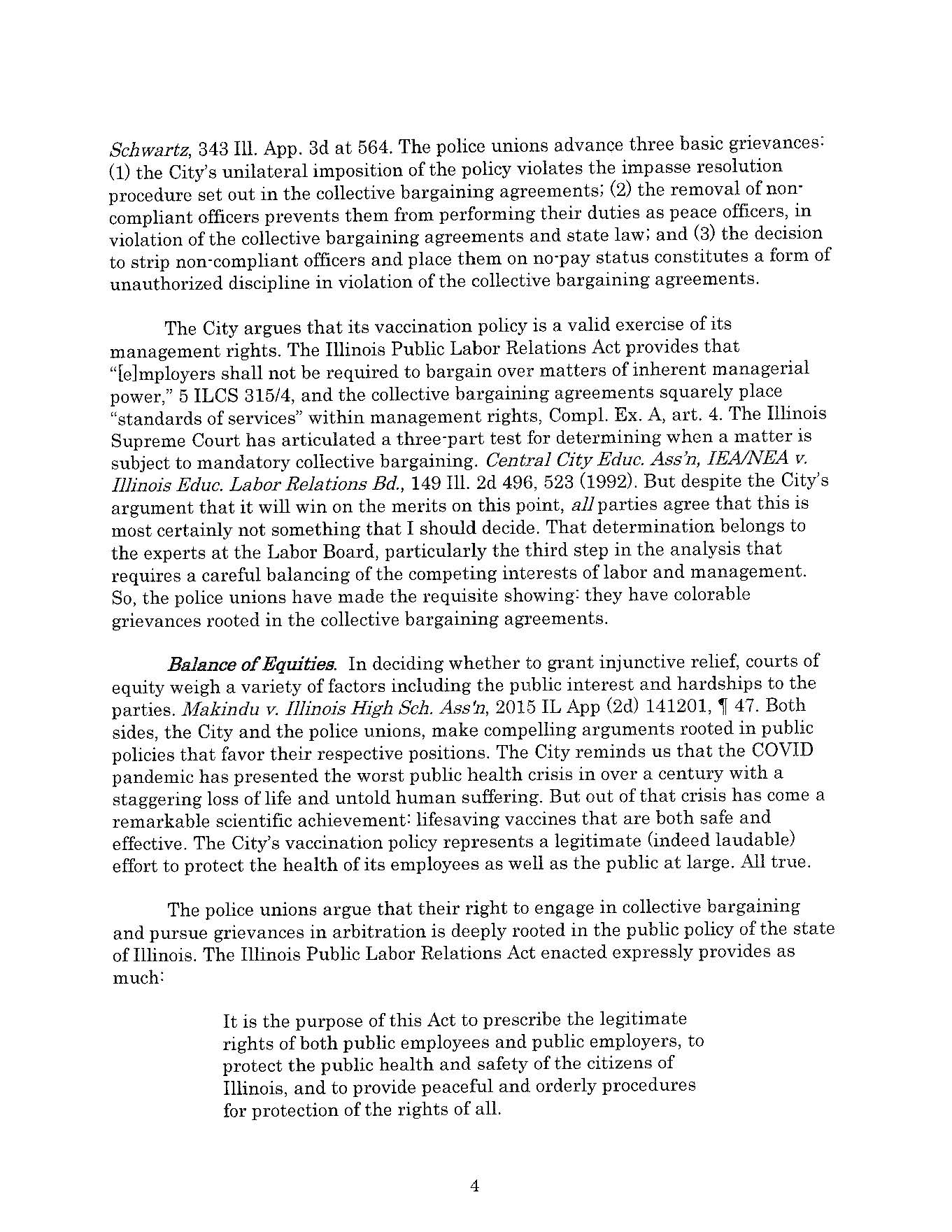
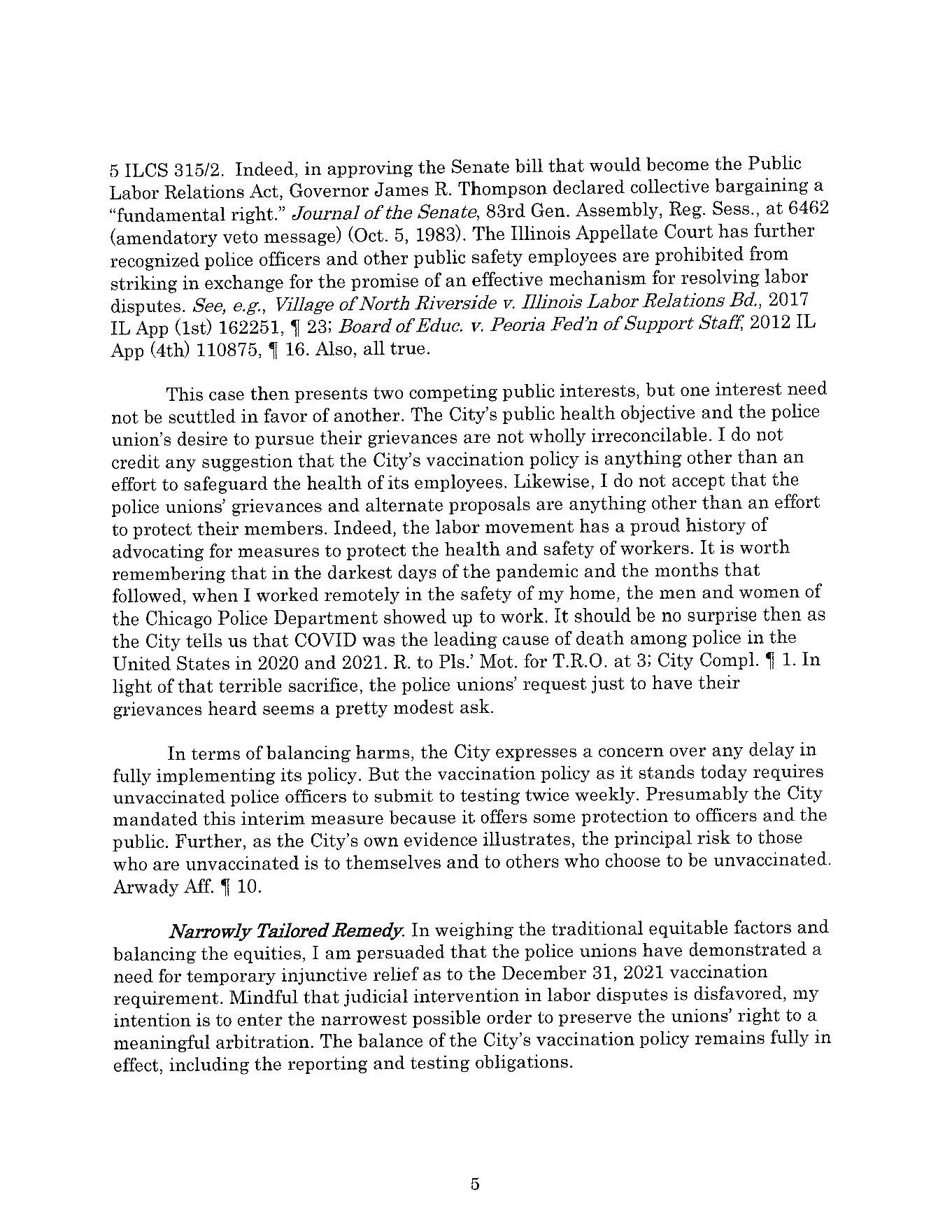
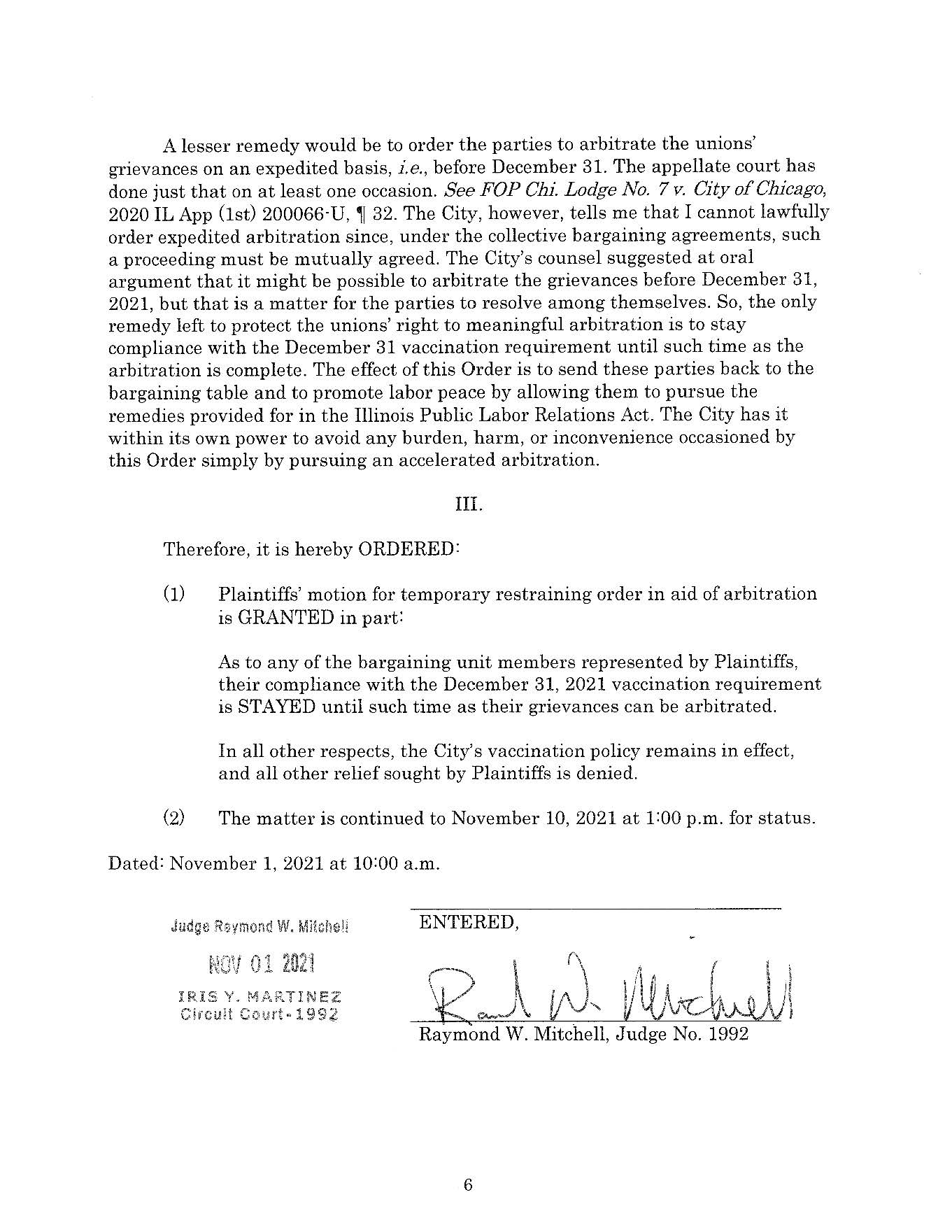
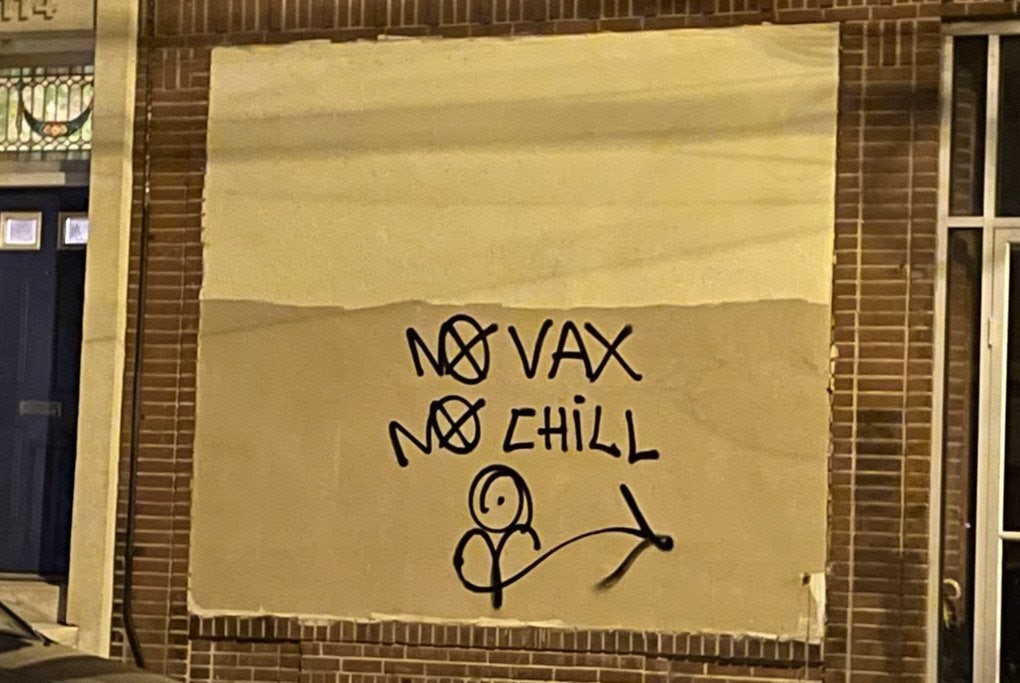 Antivaxer tagged several houses and businesses in Hawthorn and Bella Vista last night. Posted byu/hkpp 3 months ago
Antivaxer tagged several houses and businesses in Hawthorn and Bella Vista last night. Posted byu/hkpp 3 months ago
https://www.reddit.com/r/philadelphia/comments/orppi9/antivaxer_tagged_several_houses_and_businesses_in/
Original post from https://i.imgur.com/nTzcY1J.jpg

